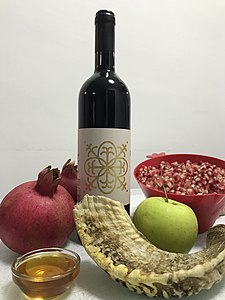Rosh Hashanah
| Rosh Hashanah | |
|---|---|
 | |
| Official name | Hebrew: ראש השנה |
| Also called | Jewish New Year |
| Observed by | Judaism and Jews; Samaritans |
| Type | Jewish; Samaritan |
| Significance | Jewish civil new year according to the Hebrew calendar. Commemorates the creation of the world as narrated in the Bible. Beginning of the ten "Days of Awe" culminating in Yom Kippur. |
| Begins | Start of first day of Tishrei |
| Ends | End of first or second day of Tishrei |
| Observances | Praying in synagogue, hearing the shofar. Festive meals with challah. Auspicious foods such as apples dipped in honey, fish heads and pomegranates are often eaten, as well as new fruits on the second night. Refraining from work. |
| Related to | Yom Kippur, the "Day of Atonement." |

Rosh Hashanah (Hebrew: ראש השנה, literally "head of the year," Biblical: IPA: [ˈɾoʃ haʃːɔˈnɔh], Israeli: [ˈʁoʃ haʃaˈna], Yiddish: [ˈroʊʃ hɑˈʃɔnə]) is a Jewish holiday commonly referred to as the "Jewish New Year." It is observed on the first day of Tishrei, the seventh month of the Hebrew calendar. The festival lasts for two days.
Rosh Hashanah is the first of the High Holidays or Yamim Noraim ("Days of Awe"), or Asseret Yemei Teshuva (The Ten Days of Repentance) which are days specifically set aside to focus on repentance that conclude with the holiday of Yom Kippur. The story of Rosh Hashanah is about Abraham and his belief in God when he was told to sacrifice his son.
It is customary to send "A Good and Happy Year" greetings on Rosh Hashanah to family and friends.
Years
[change | change source]Jewish year and Gregorian year:
- 5778 = 2017-2018
- 5779 = 2018-2019
- 5780 = 2019-2020
- 5781 = 2020-2021
- 5782 = 2021-2022
References
[change | change source]- "Jewish Holidays 2018-2019 | Hebcal Jewish Calendar". www.hebcal.com. Retrieved 2018-09-08.